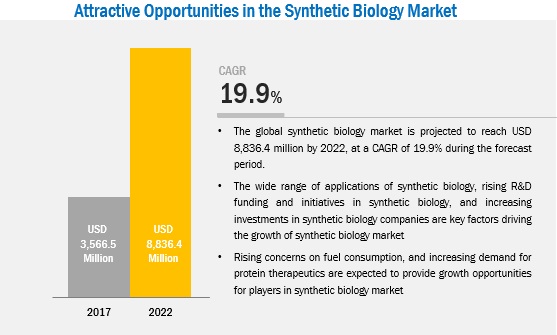The synthetic biology market is projected to reach USD 30.7 billion by 2026 from USD 9.5 billion in 2021, at a CAGR of 26.5% during the forecast period. The growth of this market is mainly driven by the increasing demand for synthetic genes and synthetic cells, a wide range of applications of synthetic biology, declining cost of DNA sequencing and synthesizing, increasing R&D funding and initiatives in synthetic biology, and increasing investments in the market.
The reduction in costs per raw megabase of DNA sequencing and a drastic reduction in the cost of synthetic genes is expected to propel the market growth of synthetic biology.
Download PDF Brochure : https://www.marketsandmarkets.com/pdfdownloadNew.asp?id=889

Wide range of applications of synthetic biology drives the global synthetic biology market
The field of medicine has been in the forefront in terms of developing and applying synthetic biology techniques for various applications. Advancements in DNA sequencing and synthesizing technologies have resulted in the better understanding of diseases, aiding the research and discovery of biopharmaceuticals, small molecules, regenerative medicine, and antibody research.
Wide range of applications of synthetic biology drive the growth of this market :
Biofuels –
Synthetic biology is also used to develop bio-based chemicals to replace petrochemicals in the coming years. Bio-isobutene developed using synthetic biology can be used in the production of biofuels, tires, lubricants, and plexiglass. Additionally, companies are investing in the development of bioisoprene for the production of bio-based rubber tyres.
Medicine
Notable advancements in DNA sequencing and synthesizing technologies have benefited in the better understanding of diseases and subsequently aided the research and discovery of biopharmaceuticals, small molecules, regenerative medicine, and antibody research. Additionally, the genetic manipulation of biosynthetic units in microorganisms has opened a new channel for the industrial production of biopharmaceuticals, such as vaccines, antibiotics, and antiparasitics (Artemisinin being a huge success).
Want Full Report? Inquire Here: https://www.marketsandmarkets.com/Enquiry_Before_BuyingNew.asp?id=889
The prominent players operating in the synthetic biology market are Thermo Fisher Scientific Inc. (US), Merck KGaA (Germany), Agilent Technologies, Inc. (US), Novozymes A/S (Denmark), and Ginkgo Bioworks (US).
Thermo Fisher Scientific (US) held the leading position in the synthetic biology market in 2020. The company offers synthetic biology products, which include DNA fragments, software, engineering kits, DNA oligos, and clones. Its large share in this market can be attributed to its broad product portfolio, years of experience, and vast distribution channel. The company’s distribution network comprises broad sales force and a global network of resellers and distributors. It is equipped with an international network of warehouses, specialized product vaults, and warehouse management systems, which maintain inventory and coordinate product deliveries. Throughout the product delivery process, the company provides its customers with convenient access to comprehensive electronic systems, allowing for automated catalog search, product orders, and invoicing & payment capabilities.


